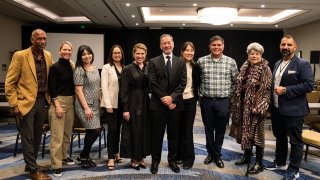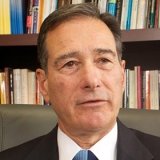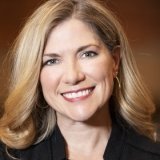From January 15 to 17, 2025, USC Rossier’s Center for Enrollment Research, Policy and Practice (CERPP) hosted its annual conference, with the theme Meeting the Moment: Leadership for Equity. This gathering brought together enrollment management leaders, researchers and education experts to confront challenges, exchange ideas, and reimagine leadership strategies that meet the current moment with an eye to inclusivity.
“It was energizing to be among colleagues who share the same concern for equitable enrollment practices.”
- CERPP 2025 attendee
In an ever-changing political landscape, the conference focused on what should always be our north star: fulfilling our institutional missions. The conference highlighted schools, colleges, universities and other organizations that are successfully cultivating campus cultures that promote student success. Given higher education’s diverse student population, integrating equity into recruitment and retention processes is essential to meeting our missions and serving our students well.
“The bulk of our attendees are practitioners—they want theory and research, but they also want to know how to implement it effectively,” said Emily Chung EdD ’15, managing director for CERPP. “That’s what they get from the conference: the opportunity to come together, exchange ideas and realize that we are all working toward the same goals. I think many found it very affirming.”
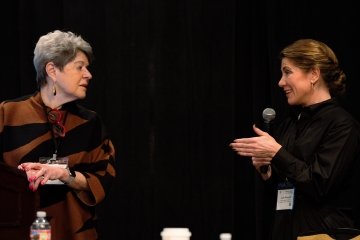
The keynote address, Elements of Equity-mindedness, presented by USC Professor Emerita Estela Bensimon, opened the conference by discussing strategies for advancing racial equity in higher education. She elucidated how race-conscious inquiry methods can help identify practices that are not effective if educational outcomes vary by race, and how this process of inquiry can serve as a catalyst for change.
Legal experts also helped clarify the implications of the Supreme Court’s Students for Fair Admissions (SFFA) ruling. Beong-Soo Kim, currently USC senior vice president and general counsel, urged conference attendees to not focus on the legal context so much as the cultural context; institutional missions provide the why we do our work and why we need to serve all of our students well. “Enrollment leaders are hyper-aware of the shifting, and even hostile, environment confronting equity in education and other walks of life,” Kim added.
As agile leaders, enrollment professionals seek ways to “meet this moment legally, effectively and flexibly” said Jerry Lucido, scholar-in-residence; professor of clinical education and moderator of this session. Art Coleman, founding partner of EducationCounsel, reminded us of the limited scope of the SFFA decision which eliminated the “check box” for racial status. Coleman stressed the importance of universities fully articulating their mission and values to guide these initiatives effectively.
The University of California, Riverside (UCR) is one example of how a focus on institutional culture led to success, with it leading the nation in indicators of social mobility for its graduates. Chancellor Kim Wilcox and members of his team including Emily Engelschall, associate vice chancellor for enrollment services, and Ken Baerenklau, associate provost, shared how UCR’s success is deeply rooted in equity-minded culture, data-driven equity framework and strategic vision. Over time, their culture was built to pair student access with academic achievement, supported by strong leadership enabling a model of inclusive excellence that is an exemplar for equity in higher education.
This focus on institutional equity seamlessly led into Exemplars in Action–Creating Systems for Belonging and Thriving, which explored how equity extends beyond recruitment and admissions to shaping learning environments that foster inclusivity for historically neglected student populations. Jared Lyon, president and CEO of Student Veterans of America, Keivan Stassun, director of the Frist Center for Autism & Innovation at Vanderbilt University, and Rachelle Hernandez, vice provost for student affairs at Johns Hopkins University, discussed how belonging is critical for paving a pathway to student success. They highlighted the importance of creating inclusive environments for all students, including veterans and neurodivergent learners. For example, while veterans enrolled in higher education have a higher degree completion rate than non-veterans, childcare is the biggest barrier to higher education. Thus providing childcare is a practical way to ensure that veterans can enroll and complete their degrees.
“An admission decision is a graduate decision is an alumni decision,” said Hernandez. “Leaders must reflect and consider which demographic of students are missing along the way to ensure that all students are successful at their institution.”
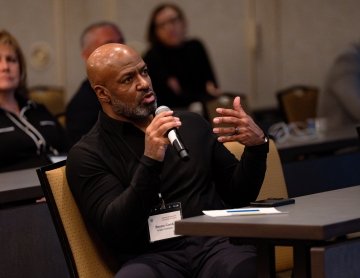
Another Exemplars in Action session featured a thought-provoking discussion of outreach, recruitment and admission. Olufemi Ogundele, associate vice chancellor and dean of enrollment management and undergraduate admissions at UC Berkeley, challenged institutions to dismantle structural barriers in admissions, such as limited access to Advanced Placement courses, that hinder student success. “Admissions is more than just a transaction, it is the best way for an institution to show its values through who they admit and why they admit them,” said Ogundele. Jim Bock further explored the impact of the SFFA ruling, urging a proactive response to legal challenges and emphasizing the need for collaboration to advance equity in enrollment practices.
Institutions face a long road ahead as they retool enrollment strategies to navigate a shifting landscape. This evolving reality sets the stage for CERPP 2026, to be held on February 25 to 27, 2026, which will focus on Institutional Resilience—a topic that grows more urgent as change accelerates and adaptability becomes essential.
Speaking about the prospects for 2025 and motivation for this theme, CERPP Executive Director Julie Posselt explained during her closing remarks: “We don’t know what is to come, how chaotic it will be, what disruptions await us…If the last eight years are an indication, we can anticipate resilience will not be optional.”
CERPP remains committed to serving as a hub of expertise and resources, equipping enrollment management professionals and educational leaders with the tools to maintain resilience and stability in an era of uncertainty.

